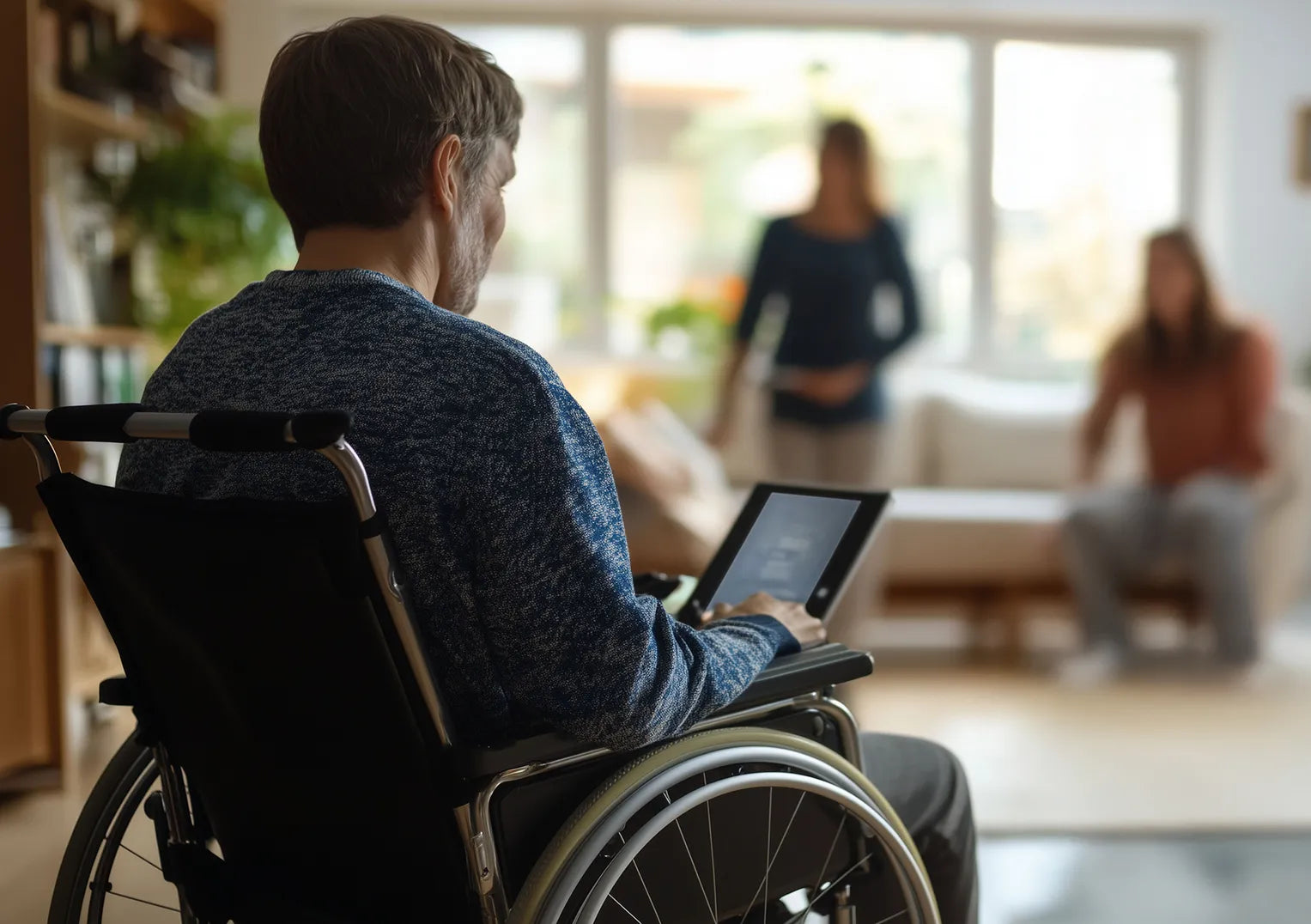
ALS is a disease that changes everything. It affects the nerve cells that control your muscles, making it harder to move, walk, and eventually speak. For many people with ALS, losing their voice feels like losing a part of who they are. But even when ALS takes away the ability to speak with your mouth, there are many ways to keep talking, sharing thoughts, and staying connected with the people you love.
Understanding How ALS Affects Speech
ALS stands for Amyotrophic Lateral Sclerosis. Some people call it Lou Gehrig's disease, named after a famous baseball player who had it. This disease attacks the motor neurons in your brain and spinal cord. These are special nerve cells that send messages from your brain to your muscles, telling them when and how to move.
When ALS affects the muscles used for speaking, it can cause several problems. Your tongue might not move as well as it used to. Your lips might feel weak. The muscles that help you breathe and push air through your vocal cords can also become weaker. All of these changes can make it hard for others to understand what you're saying.
At first, you might notice that your words sound a little slurred or unclear. Family members might ask you to repeat yourself more often. As time goes on, speaking can become more tiring and difficult. Some people find that their voice gets quieter or sounds different than before. Eventually, many people with ALS lose the ability to speak out loud completely.
This doesn't mean they have nothing to say. Their minds usually stay sharp and clear. They still have thoughts, feelings, jokes, and important things to share. The challenge is finding new ways to get those thoughts out of their heads and into the world.
Simple Communication Tools That Help Right Away
When speaking becomes difficult, there are some easy tools that can help right away. These don't require any special training or expensive equipment. Many families start with these simple methods before moving on to more advanced options.
Writing things down is often the first step. A simple notebook and pen can be very powerful. Some people keep small whiteboards around the house so they can write messages and erase them when they're done. Others use tablets or phones to type messages and show them to family members.
Pointing can also be very helpful. You can point to objects, pictures, or words to show what you mean. Some families create simple boards with common words, pictures of family members, or drawings of things the person might need. This way, pointing becomes a quick way to communicate basic needs and ideas.
Gestures and facial expressions become more important too. A thumbs up, a nod, or a smile can say a lot. Many families develop their own special signals. Maybe raising one finger means "yes" and raising two fingers means "no." These personal codes can work really well for daily communication.
Technology That Gives You A Voice
Today's technology offers amazing tools for people who can't speak with their natural voice. These devices and apps can turn typed words into spoken words, giving people with ALS a new way to talk.
Speech-generating devices, sometimes called SGDs, are special computers made just for communication. They have screens where you can type or select words, and then the device speaks those words out loud. Some of these devices are small and portable, while others are larger and stay in one place.
Many tablets and smartphones now have communication apps built right in. These apps let you type messages that the device will read out loud. Some apps even let you save common phrases so you don't have to type them over and over again. You might save phrases like "I'm hungry," "I need help," or "I love you" for quick access.
One of the most exciting developments is eye-tracking technology. This lets people control computers and communication devices just by looking at different parts of the screen. Special cameras watch where your eyes are looking and can tell when you want to select a word or letter. This technology helps people who can no longer use their hands or fingers to type.
Voice banking is another incredible tool. This lets people record their own voice saying many different words and sounds while they can still speak clearly. Later, when they can no longer talk, special software can use these recordings to create new words and sentences that sound like their original voice. It's like saving your voice for the future.
Staying Connected with Family and Friends
Communication isn't just about asking for things you need. It's also about staying close to the people who matter to you. ALS might change how you talk, but it doesn't have to change your relationships.
Video calls can be wonderful for staying in touch with people who live far away. Even if you can't speak during the call, you can still see each other's faces and use gestures or written messages. Many families set up regular video call times so everyone can stay connected.
Social media and messaging apps help too. You can share photos, send messages, and keep up with what's happening in your friends' and family's lives. Some people with ALS become very good at using these tools to stay active in their communities.
Email can be a great way to have longer, more detailed conversations. Unlike quick text messages, emails give you time to think about what you want to say and express complex thoughts and feelings. Some people with ALS find that they actually communicate more deeply through writing than they ever did through speaking.
Getting Help from Speech Therapists
Speech-language pathologists, also called speech therapists, are experts who can help people with ALS communicate better. They understand how the disease affects speech and can suggest the best tools and techniques for each person's specific situation.
A speech therapist can help you learn to use new communication devices. They can show you the best apps for your needs and teach you shortcuts that make communication faster and easier. They also know about funding programs that might help pay for expensive communication equipment.
These professionals can also help your family learn new ways to communicate with you. They might teach your loved ones to be more patient, to ask yes-or-no questions instead of open-ended ones, or to give you more time to respond. Good communication takes practice from everyone involved.
Speech therapists often work with other members of your healthcare team. They might talk to your doctor about medications that could help with muscle control, or work with occupational therapists to make sure your communication devices are set up in the most comfortable way possible.
Planning Ahead for Communication Needs
ALS affects everyone differently, and it's hard to know exactly how the disease will progress. But planning ahead for communication needs can make things easier later on. This doesn't mean giving up hope or expecting the worst. It just means being prepared.
Many people start exploring communication options while they can still speak fairly well. This gives them time to learn new tools without pressure. It also helps them figure out what works best for their lifestyle and personality. Some people love high-tech solutions, while others prefer simpler approaches.
Talking with your family about your communication preferences is important too. Let them know what kinds of conversations matter most to you. Maybe you want to make sure you can still tell bedtime stories to your grandchildren, or maybe it's important that you can participate in family decisions. Knowing your priorities helps everyone work together to find the right solutions.
It's also worth thinking about important messages you might want to record while your voice is still clear. Some people record birthday messages for future years, or create audio letters for special occasions. Others record themselves reading favorite books or telling family stories. These recordings become precious gifts for the people you love.
The Emotional Side of Losing Your Voice
Losing the ability to speak can be one of the hardest parts of having ALS. Your voice is part of who you are. It's how you've expressed your personality, shared your thoughts, and connected with others your whole life. It's completely normal to feel sad, frustrated, or scared about these changes.
Many people worry that they'll become a burden on their families or that people will stop wanting to spend time with them. These fears are understandable, but they're often not true. The people who love you care about much more than just your ability to speak. They want to hear your thoughts and feelings, no matter how you share them.
Some people find that losing their voice actually makes their other forms of communication stronger. They might become better writers, more expressive with their faces and hands, or more thoughtful about what they want to say. While this doesn't make up for the loss, it can be a source of comfort and pride.
Counseling and support groups can be very helpful during this time. Talking to other people who understand what you're going through can provide comfort and practical advice. Many support groups now meet online, making them accessible even for people who have trouble traveling.
Building a Support Network
Communication is a team effort, especially when ALS is involved. Building a strong support network makes everything easier and more successful. This network might include family members, friends, healthcare providers, and other people with ALS.
Family members and close friends often become communication partners. These are people who learn your new ways of communicating and help translate for others when needed. They might learn to read your gestures, understand your communication device, or help you write messages. Having several communication partners means you're not dependent on just one person.
Healthcare providers are also important members of your support team. Besides speech therapists, you might work with occupational therapists who can help position communication devices comfortably, or social workers who know about funding resources and community programs.
Online communities can provide support and advice from people who really understand what you're going through. Many websites and social media groups are specifically for people with ALS and their families. These communities share tips about communication tools, emotional support, and practical advice for daily living.
Looking Forward with Hope
While ALS presents serious challenges, new communication technologies are being developed all the time. Researchers are working on brain-computer interfaces that might let people control devices just by thinking. Other scientists are improving eye-tracking technology and making it more affordable and easier to use.
The most important thing to remember is that losing your voice doesn't mean losing your ability to communicate or connect with others. It means learning new ways to share the thoughts, feelings, and love that make you who you are. With the right tools, support, and attitude, you can continue to be an active part of your family and community.
Every person with ALS has a unique story and unique communication needs. What works perfectly for one person might not be right for another. The key is to stay open to trying new things, be patient with yourself as you learn, and remember that good communication is about much more than just the words we speak. It's about connection, understanding, and love – and those things can never be taken away by any disease.





